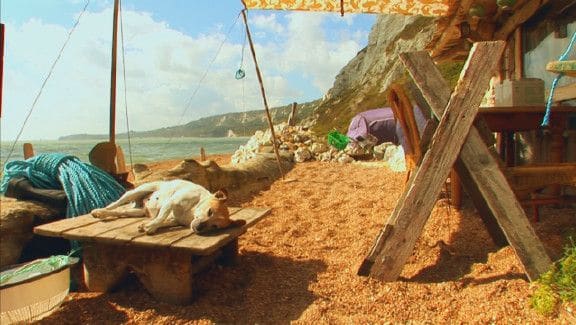Eye For Film >> Movies >> Life's A Beach (2014) Film Review
Life's A Beach
Reviewed by: Jennie Kermode

Many people complain about the state interfering in their lives, or worry that it's getting too big, but we all depend on it to some degree or other. Jerry Francis, known as Mungo, might be the closest thing you'll find to an exception, at least in the UK. Not a complainer but a do-er, he took it upon himself to live outside the system, building himself a house from debris that he found on Folkestone beach. This film chronicles his battles, with private and public bodies, to be allowed to stay there.
It's a simple, lyrical film, with beautiful photography that amply conveys Mungo's love of his home without flinching from the harshness of the colder seasons. Much of the music comes from Mungo's friends, who crowd into the tiny cottage built of driftwood and the remnants of cars and boats. The man's ingenuity is remarkable. Somehow he has built himself a stove with a proper chimney, coppicing the hillside to feed it; it easily warms the small structure and keeps his dog happy. He's also provided himself with electricity. Outside, hens strut around the beach, their eggs ay least one source of food. It would be nice to have more detail about how basic necessities are dealt with, but it is implied that Mungo hasn't totally cut himself off, still making trips into town. He's not against the system, he just wants the right to do his own thing.

Whether or not this harms anyone else is unclear. Mungo refers vaguely to a conservation group having concerns, but we don't hear its point of view directly and he gives no details. What he does do is talk at length about how people have lived in Britain for thousands of years, lamenting lost freedoms and a lack of historical awareness that may be related to this. Not altogether opposed to modern living, his aim seems to be to draw out the best of both worlds. In one of the film's most poignant moments he holds up a string of beads and asks viewers to think about how much work has gone into each of them. This isn't anti-materialism, more an exhortation to give the material proper respect, and thereby to take more joy in it.
As a portrait of an unusual man, this has much to recommend it. Elsewhere, however, it's not so strong. We get a lot of detail but not much real information about the problems that Mungo faces in trying to defend his home. There is a constant sense that we're seeing only half the picture. As a result the film seems to drift, unanchored, only intermittently regaining its sense of purpose. It's an intriguing curiosity but it never quite fulfils its potential.
Reviewed on: 16 Feb 2015
















